 |
The Cluanie Inn is a hotel and bar
with a
small filling station attached. A couple of cottages and mobile homes
stand
nearby. To the west there's nothing else until Shiel Bridge, and to the
east there are just a scattering of similar localities down near
Torgoyle
Bridge in Glen Morriston. The inn has been imaginatively extended, with
a single-storey ranch style quadrangle around a central garden area.
It's
inexpensive, and popular with climbers and hikers as well as passing
tourists.
(This endorsement was entirely
unsolicited.
I just like the place).
|
 |
There's no TV signal available here
but the
radio weather forecast promises one of those all too familiar Scottish
days - bright but not sunny. There is likely to be hill fog but at
least
there's a very good chance of it staying dry, and that's a bonus in the
Highlands. There are breaks in the cloud, particularly to the east as
seen
in this shot. |
 |
The South Glenshiel Ridge is almost
unique
in Scottish topography - it consists of seven Munros and two lesser
summits,
all spread out in a single line along the southern side of the glen.
The
whole expedition is one of 24km - plus, of course, the return walk
along
the glen - and only the super fit would consider tackling it in one
day.
More ordinary walkers like me are inclined to follow the recommendation
in most of the guidebooks and to regard it as two separate day walks.
I'm
setting out to walk the eastern half, which will consist of four
Munros.
The sun glints over the unseen Loch Cluanie to the east of the hotel as
I begin the walk. |

|
The route runs along the road for a
couple
of hundred yards before turning right for an estate track running
around
the west end of Loch Cluanie and heading for Cluanie Lodge. Here, about
10 minutes after starting off, I'm looking back at the Cluanie Inn with
the pass of An Caorainn Beag behind. |

|
Further along the Cluanie Lodge
track, the
view northwest encompasses the west end of Loch Cluanie and the pass of
An Caorainn Mor, which leads to the Altbeithe youth hostel in upper
Glen
Affric. |

|
Looking east along Loch Cluanie.
rather a
lot of cloud, but Glen Morriston is down there somewhere. |

|
The shoulder of Aonach Mheadoin and
the shapely
cone of Am Bathach form the north wall of Glen Cluanie. Loch Cluanie is
in the foreground and the Cluanie Inn can still be seen over to the
left. |

|
The route now leaves the Cluanie
Lodge access
track for a hill track leading over to Loch Loyne. This is another view
eastwards along the length of Loch Cluanie. The clouds are building up
and what little sunshine there is can surely not last. |

|
The path curves around the eastern
end of
Creag a Mhaim, the easternmost mountain in the South Glenshiel range.
Here
it doglegs into Coire Guibhais. One guidebook recommends this corrie as
an ascent route, but there is no path here and I have my eye on a much
more straightforward ascent. |

|
Three miles from Cluanie Inn, and
the track
has curved some three quarters of the way around the mountain. Just
beyond
the point where it starts to lose height again on the way to Loch Loyne
a fainter path strikes off over the moorland to the southwest, and in
three
hundred meters this path joins the southeast ridge of Creag a Mhaim.
Loch
Loyne is seen here from the ridge. |
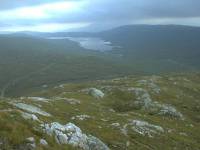
|
A stalker's path climbs the
southeast ridge
and proves to be the easiest ascent I've ever tackled in the Highlands.
I've often read that Creag a Mhaim is an ideal first Munro thanks to
the
ease of ascent, and now I'm finding out that this opinion is probably
justified.
The path is easily graded, well defined and - above all - firm, level
and
easy on the ankles. From the foot of the ridge to the summit is an
ascent
of almost exactly 500 meters, around 1650ft. I make good time but, two
thirds of the way up, I hit the cloudbase and climb the rest of the way
in fog. |
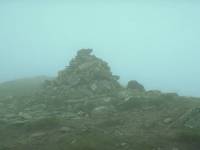
|
Creag a Mhaim, 947 meters or
3107ft, was
a deceptively easy climb. I've had better summit views, though. |

|
From Creag a Mhaim there's perhaps
a kilometre
of ridge walk west northwestwards to the second Munro, Druim Shionnach
(foxes' ridge). Looking back along the way I've come there's a sudden
and
tantalizing clearance of the mist from the southern slopes. |
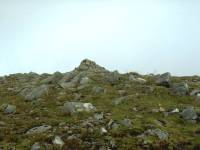
|
The reascent to Druim Shionnach is
only about
350ft, though the last two hundred meters is surprisingly narrow and is
a little like Striding Edge in the Lake District - though wider, and
not
as extensive. I reached the summit only half an hour after leaving
Creag
a Mhaim. Druim Shionnach is my seventeenth Munro and my second of the
day,
and at 3238ft above sea level it's Scotland's 160th highest
mountain. |

|
There's a slight change of
direction now.
There's over 2km of ridge between Shionnach and the third Munro, Aonach
air Chrith, and it initially runs west southwest then veers west.
Another
brief clearance as the cloudbase lifts momentarily. |

|
I'm dropping to the col at around
900m, and
suddenly the cloud lifts to reveal this view along Coire an t-Slugain,
looking straight down to the Cluanie Inn. |

|
And, suddenly, I can see the rather
daunting
shape of Aonach air Chrith a kilometre ahead. |

|
With the cloudbase lifting I can
start snapping
away at last. The retrospective view of Druim Shionnach. |

|
Pretty much at the lowest point
between the
two Munros here. The path is very well defined all the way along the
ridge
- not that it's necessary, for you're not going to go astray (even in
mist),
and the terrain is easy. |

|
A nameless corrie west of Coire an
t-Slugain,
with the north ridge of Aonach air Chrith forming its west wall. The
peak
at the far end is A Chioch ("The Breast"), a "top" of Aonach air Chrith. |
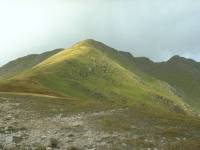
|
Aonach air Chrith is a complex
little Munro. |

|
The view to the rear is improving
and I can
now see both Druim Shionnach (to the left) and Creag a Mhaim (just
right
of centre). |
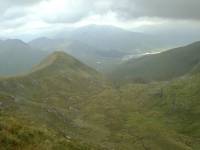
|
Looking along that northern corrie
again,
with A Chioch to the left and a shaft of sunlight down at the Cluanie
Inn.
Muriel Gray, in her book "The First Fifty" makes great play of being
able
to see the inn from most of the ridge. "You can keep an eye on the
chambermaid
turning down your bed," she says. |

|
Looking back at the col on the way
up to
Aonach air Chrith. There's 140m of reascent, or nearly 500ft - a rather
daunting prospect. |
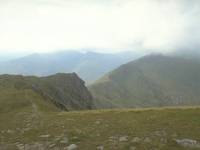
|
It didn't take too long, however,
and an
hour after leaving Shionnaich I'm looking at the view westwards from
the
summit of Aonach air Chrith. |

|
The summit of Aonach air Chrith:
3350ft,
or 1021 meters, the 109th highest mountain in Scotland. And my
eighteenth
Munro. |

|
The view southwestwards to the
shapely bulk
of Gleouriach (3396ft), with a hint of Loch Quoich beyond. |
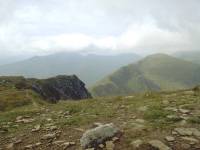
|
The view westwards along the South
Glenshiel
ridge towards the fourth summit, Maol Chinn-Dearg. I don't like the
look
of that rather precipitous drop about half a kilometre ahead. |

|
Aonach air Chrith's north ridge is
quite
a sight, though. It's called Druim na Ciche (the breast ridge). Wonder
how it got that name? |

|
Another view of Druim na Ciche.
(Yes, alright,
it does look like a huge nipple. There, I said it). |

|
The cloudbase having lifted now,
I'm getting
an excellent view eastwards along the ridge, back along the route I've
already walked. |

|
For the first time there's a decent
view
northwestwards along Glen Shiel itself. The Five Sisters of Kintail and
the Saileag group dominate the north wall of the glen. |

|
A look at the map confirms that
there's rather
a steep drop beyond Aonach air Chrith to the col. Beyond it, across the
upper Quoich glen, looms Sgurr a Mhaoraich. |
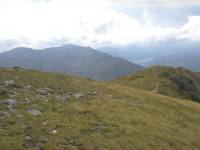
|
Moving off Aonach air Chrith to the
west
now, over very east terrain. Gleouriach looks magnificent across the
glen
to the south west. |
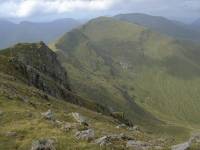
|
The massive bowl of Coire nan
Eirecheanach
separates Aonach air Chrith from Maol Chinn Dearg. |
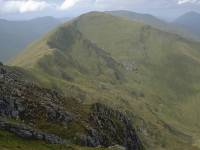
|
The view of the narrowest part of
the ridge
from the top of that steep drop. |

|
I didn't take any pictures during
the descent
to the col. It looked pretty steep and so it proved to be. For about
four
hundred meters west of the summit dome the ridge path is rough and
slightly
scrambly. Not actually difficult, and certainly not exposed, but it
does
require care. This is the view from the foot of the bouldery staircase,
where things calm down once again. |

|
The rest of the two kilometre ridge
walk
to Maol Chinn-Dearg is fine. There are a few minor tops on the way,
which
can be climbed or bypassed to the left according to taste. With a
minimum
of 350ft of reascent between me and the next Munro, however, I was
inclined
to leave the minor tops out. Even on a highly invigorating and
relatively
straightforward ridge walk such as this, you can only be prepared to
expend
so much effort. |

|
Here's one of the minor tops, an
apparently
nameless summit of 892m elevation. |
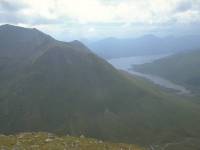
|
Loch Quoich is now coming into view
to the
right of Gleouriach. |

|
Approaching the top of Maol Chinn
Dearg,
and looking southwest down to Loch Quoich. |

|
Looking out along the Coire nan
Eirecheanach
towards the Cluanie Inn. Is my bed made yet? |
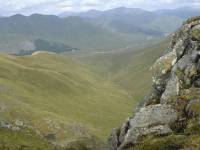
|
The same view, from the summit. |

|
Looking back along the ridge from
Maol Chinn-Dearg
to Aonach air Chrith. |

|
The summit cairn of Maol Chinn
Dearg, 3218ft
or 981m, and my nineteenth Munro. The view southwestwards over Loch
Quoich,
and a tantalising glimpse of Knoydart beyond. |
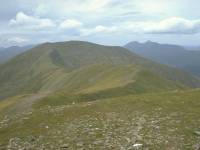
|
The view westwards from Maol
Chinn-Dearg.
This is going to be my last Munro of the day, but had I chosen to go on
this would have been the country I would have covered next. Past the
minor
summit of Sgurr Coire na Feinne is the next Munro of the ridge, Sgurr
na
Doire Leathain. |

|
A retrospective view of Aonach air
Chrith. |
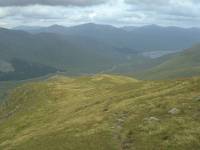
|
The northern ridge of Maol
Chinn-Dearg. This
is going to be my descent route back to Glen Shiel. And yes, the
Cluanie
Inn is still in view. |
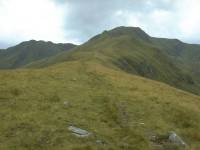
|
According to the guidebook, a path
would
be found once I had descended quite some way down this ridge. In fact
there
was a path, and a good one, virtually all the way. The ridge forms part
of the main watershed; water falling to the east finds its way into
Loch
Cluanie, then via Glen Morriston to Loch Ness; water falling to the
west
runs down Glen Shiel to Loch Duich. |
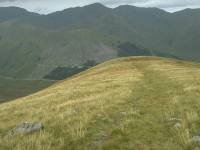
|
Like the path ascending Creag a
Mhaim, this
one is very reasonably graded and is equally easy on the feet. The
ridge
did not descend at a constant angle, but as a series of shoulders with
linking ridges that were almost level in places. |
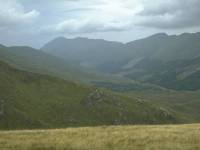
|
The Five Sisters of Kintail seen
from the
descent. |
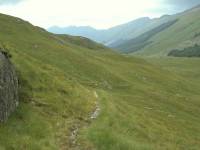
|
Only in its lower stages did the
path start
to deteriorate. It described a series of zigzags down the last steep
pitch,
leaving only half a mile of drab moorland to cross to regain the main
road. |
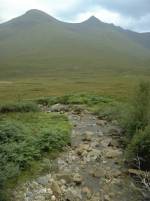
|
A couple of hundred meters short of
the road,
the path joins a rather more well defined one coming down from Coire a
Chuil Droma Mor, used as an ascent route to the western half of the
ridge.
Some day I'll come back and walk the rest of it.
There was a walk of less than two
miles back
to the Cluanie Inn, and I was luxuriating under a welcome shower well
before
5pm.
|
![]()